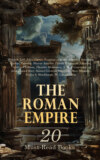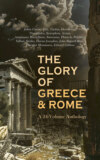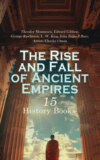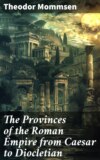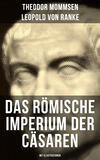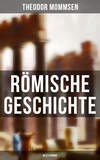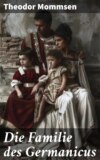Читать книгу: «The History of Rome, Book IV», страница 34
Latin Instruction
Public Readings of Classical Works
But by its side there sprang up also a higher Latin instruction. We have shown in the previous epoch how Latin elementary instruction raised its character; how the place of the Twelve Tables was taken by the Latin Odyssey as a sort of improved primer, and the Roman boy was now trained to the knowledge and delivery of his mother-tongue by means of this translation, as the Greek by means of the original: how noted teachers of the Greek language and literature, Andronicus, Ennius, and others, who already probably taught not children properly so called, but boys growing up to maturity and young men, did not disdain to give instruction in the mother-tongue along with the Greek. These were the first steps towards a higher Latin instruction, but they did not as yet form such an instruction itself. Instruction in a language cannot go beyond the elementary stage, so long as it lacks a literature. It was not until there were not merely Latin schoolbooks but a Latin literature, and this literature already somewhat rounded-off in the works of the classics of the sixth century, that the mother-tongue and the native literature truly entered into the circle of the elements of higher culture; and the emancipation from the Greek schoolmasters was now not slow to follow. Stirred up by the Homeric prelections of Crates, cultivated Romans began to read the recitative works of their own literature, the Punic War of Naevius, the Annals of Ennius, and subsequently also the Poems of Lucilius first to a select circle, and then in public on set days and in presence of a great concourse, and occasionally also to treat them critically after the precedent of the Homeric grammarians. These literary prelections, which cultivated -dilettanti- (-litterati-) held gratuitously, were not formally a part of juvenile instruction, but were yet an essential means of introducing the youth to the understanding and the discussion of the classic Latin literature.
Rhetorical Exercises
The formation of Latin oratory took place in a similar way. The Roman youth of rank, who were even at an early age incited to come forward in public with panegyrics and forensic speeches, can never have lacked exercises in oratory; but it was only at this epoch, and in consequence of the new exclusive culture, that there arose a rhetoric properly so called. Marcus Lepidus Porcina (consul in 617) is mentioned as the first Roman advocate who technically handled the language and subject-matter; the two famous advocates of the Marian age, the masculine and vigorous Marcus Antonius (611- 667) and the polished and chaste orator Lucius Crassus (614-663) were already complete rhetoricians. The exercises of the young men in speaking increased naturally in extent and importance, but still remained, just like the exercises in Latin literature, essentially limited to the personal attendance of the beginner on the master of the art so as to be trained by his example and his instructions.
Formal instruction both in Latin literature and in Latin rhetoric was given first about 650 by Lucius Aelius Praeconinus of Lanuvium, called the "penman" (-Stilo-), a distinguished Roman knight of strict conservative views, who read Plautus and similar works with a select circle of younger men—including Varro and Cicero—and sometimes also went over outlines of speeches with the authors, or put similar outlines into the hands of his friends. This was instruction, but Stilo was not a professional schoolmaster; he taught literature and rhetoric, just as jurisprudence was taught at Rome, in the character of a senior friend of aspiring young men, not of a man hired and holding himself at every one's command.
Course of Literature and Rhetoric
But about his time began also the scholastic higher instruction in Latin, separated as well from elementary Latin as from Greek instruction, and imparted in special establishments by paid masters, ordinarily manumitted slaves. That its spirit and method were throughout borrowed from the exercises in the Greek literature and language, was a matter of course; and the scholars also consisted, as at these exercises, of youths, and not of boys. This Latin instruction was soon divided like the Greek into two courses; in so far as the Latin literature was first the subject of scientific lectures, and then a technical introduction was given to the preparation of panegyrics, public, and forensic orations. The first Roman school of literature was opened about Stilo's time by Marcus Saevius Nicanor Postumus, the first separate school for Latin rhetoric about 660 by Lucius Plotius Gallus; but ordinarily instructions in rhetoric were also given in the Latin schools of literature. This new Latin school-instruction was of the most comprehensive importance. The introduction to the knowledge of Latin literature and Latin oratory, such as had formerly been imparted by connoisseurs and masters of high position, had preserved a certain independence in relation to the Greeks. The judges of language and the masters of oratory were doubtless under the influence of Hellenism, but not absolutely under that of the Greek school-grammar and school-rhetoric; the latter in particular was decidedly an object of dread. The pride as well as the sound common sense of the Romans demurred to the Greek assertion that the ability to speak of things, which the orator understood and felt, intelligibly and attractively to his peers in the mother-tongue could be learned in the school by school-rules. To the solid practical advocate the procedure of the Greek rhetoricians, so totally estranged from life, could not but appear worse for the beginner than no preparation at all; to the man of thorough culture and matured by the experience of life, the Greek rhetoric seemed shallow and repulsive; while the man of serious conservative views did not fail to observe the close affinity between a professionally developed rhetoric and the trade of the demagogue. Accordingly the Scipionic circle had shown the most bitter hostility to the rhetoricians, and, if Greek declamations before paid masters were tolerated doubtless primarily as exercises in speaking Greek, Greek rhetoric did not thereby find its way either into Latin oratory or into Latin oratorical instruction. But in the new Latin rhetorical schools the Roman youths were trained as men and public orators by discussing in pairs rhetorical themes; they accused Ulysses, who was found beside the corpse of Ajax with the latter's bloody sword, of the murder of his comrade in arms, or upheld his innocence; they charged Orestes with the murder of his mother, or undertook to defend him; or perhaps they helped Hannibal with a supplementary good advice as to the question whether he would do better to comply with the invitation to Rome, or to remain in Carthage, or to take flight. It was natural that the Catonian opposition should once more bestir itself against these offensive and pernicious conflicts of words. The censors of 662 issued a warning to teachers and parents not to allow the young men to spend the whole day in exercises, whereof their ancestors had known nothing; and the man, from whom this warning came, was no less than the first forensic orator of his age, Lucius Licinius Crassus. Of course the Cassandra spoke in vain; declamatory exercises in Latin on the current themes of the Greek schools became a permanent ingredient in the education of Roman youth, and contributed their part to educate the very boys as forensic and political players and to stifle in the bud all earnest and true eloquence.
As the aggregate result of this modern Roman education there sprang up the new idea of "humanity," as it was called, which consisted partly of a more or less superficial appropriation of the aesthetic culture of the Hellenes, partly of a privileged Latin culture as an imitation or mutilated copy of the Greek. This new humanity, as the very name indicates, renounced the specific characteristics of Roman life, nay even came forward in opposition to them, and combined in itself, just like our closely kindred "general culture," a nationally cosmopolitan and socially exclusive character. Here too we trace the revolution, which separated classes and blended nations.
Chapter XIII
Literature and Art
Literary Reaction
The sixth century was, both in a political and a literary point of view, a vigorous and great age. It is true that we do not find in the field of authorship any more than in that of politics a man of the first rank; Naevius, Ennius, Plautus, Cato, gifted and lively authors of distinctly-marked individuality, were not in the highest sense men of creative talent; nevertheless we perceive in the soaring, stirring, bold strain of their dramatic, epic, and historic attempts, that these rest on the gigantic struggles of the Punic wars. Much is only artificially transplanted, there are various faults in delineation and colouring, the form of art and the language are deficient in purity of treatment, Greek and national elements are quaintly conjoined; the whole performance betrays the stamp of its scholastic origin and lacks independence and completeness; yet there exists in the poets and authors of that age, if not the full power to reach their high aim, at any rate the courage to compete with and the hope of rivalling the Greeks. It is otherwise in the epoch before us. The morning mists fell; what had been begun in the fresh feeling of the national strength hardened amidst war, with youthful want of insight into the difficulty of the undertaking and into the measure of their own talent, but also with youthful delight in and love to the work, could not be carried farther now, when on the one hand the dull sultriness of the approaching revolutionary storm began to fill the air, and on the other hand the eyes of the more intelligent were gradually opened to the incomparable glory of Greek poetry and art and to the very modest artistic endowments of their own nation. The literature of the sixth century had arisen from the influence of Greek art on half-cultivated, but excited and susceptible minds. The increased Hellenic culture of the seventh called forth a literary reaction, which destroyed the germs of promise contained in those simple imitative attempts by the winter-frost of reflection, and rooted up the wheat and the tares of the older type of literature together.
Scipionic Circle
This reaction proceeded primarily and chiefly from the circle which assembled around Scipio Aemilianus, and whose most prominent members among the Roman world of quality were, in addition to Scipio himself, his elder friend and counsellor Gaius Laelius (consul in 614) and Scipio's younger companions, Lucius Furius Philus (consul in 618) and Spurius Mummius, the brother of the destroyer of Corinth, among the Roman and Greek literati the comedian Terence, the satirist Lucilius, the historian Polybius, and the philosopher Panaetius. Those who were familiar with the Iliad, with Xenophon, and with Menander, could not be greatly impressed by the Roman Homer, and still less by the bad translations of the tragedies of Euripides which Ennius had furnished and Pacuvius continued to furnish. While patriotic considerations might set bounds to criticism in reference to the native chronicles, Lucilius at any rate directed very pointed shafts against "the dismal figures from the complicated expositions of Pacuvius"; and similar severe, but not unjust criticisms of Ennius, Plautus, Pacuvius—all those poets "who appeared to have a licence to talk pompously and to reason illogically"—are found in the polished author of the Rhetoric dedicated to Herennius, written at the close of this period. People shrugged their shoulders at the interpolations, with which the homely popular wit of Rome had garnished the elegant comedies of Philemon and Diphilus. Half smiling, half envious, they turned away from the inadequate attempts of a dull age, which that circle probably regarded somewhat as a mature man regards the poetical effusions of his youth; despairing of the transplantation of the marvellous tree, they allowed the higher species of art in poetry and prose substantially to fall into abeyance, and restricted themselves in these departments to an intelligent enjoyment of foreign masterpieces. The productiveness of this epoch displayed itself chiefly in the subordinate fields of the lighter comedy, the poetical miscellany, the political pamphlet, and the professional sciences. The literary cue was correctness, in the style of art and especially in the language, which, as a more limited circle of persons of culture became separated from the body of the people, was in its turn divided into the classical Latin of higher society and the vulgar Latin of the common people. The prologues of Terence promise "pure Latin"; warfare against faults of language forms a chief element of the Lucilian satire; and with this circumstance is connected the fact, that composition in Greek among the Romans now falls decidedly into the shade. In so far certainly there is an improvement; inadequate efforts occur in this epoch far less frequently; performances in their kind complete and thoroughly pleasing occur far oftener than before or afterwards; in a linguistic point of view Cicero calls the age of Laelius and Scipio the golden age of pure unadulterated Latin. In like manner literary activity gradually rises in public opinion from a trade to an art. At the beginning of this period the preparation of theatrical pieces at any rate, if not the publication of recitative poems, was still regarded as not becoming for the Roman of quality; Pacuvius and Terence lived by their pieces; the writing of dramas was entirely a trade, and not one of golden produce. About the time of Sulla the state of matters had entirely changed. The remuneration given to actors at this time proves that even the favourite dramatic poet might then lay claim to a payment, the high amount of which removed the stigma. By this means composing for the stage was raised into a liberal art; and we accordingly find men of the highest aristocratic circles, such as Lucius Caesar (aedile in 664, 667), engaged in writing for the Roman stage and proud of sitting in the Roman "poet's club" by the side of the ancestorless Accius. Art gains in sympathy and honour; but the enthusiasm has departed in life and in literature. The fearless self-confidence, which makes the poet a poet, and which is very decidedly apparent in Plautus especially, is found in none of those that follow; the Epigoni of the men that fought with Hannibal are correct, but feeble.
Tragedy
Pacuvius
Let us first glance at the Roman dramatic literature and the stage itself. Tragedy has now for the first time her specialists; the tragic poets of this epoch do not, like those of the preceding, cultivate comedy and epos side by side. The appreciation of this branch of art among the writing and reading circles was evidently on the increase, but tragic poetry itself hardly improved. We now meet with the national tragedy (-praetexta-), the creation of Naevius, only in the hands of Pacuvius to be mentioned immediately— an after-growth of the Ennian epoch. Among the probably numerous poets who imitated Greek tragedies two alone acquired a considerable name. Marcus Pacuvius from Brundisium (535-c. 625) who in his earlier years earned his livelihood in Rome by painting and only composed tragedies when advanced in life, belongs as respects both his years and his style to the sixth rather than the seventh century, although his poetical activity falls within the latter. He composed on the whole after the manner of his countryman, uncle, and master Ennius. Polishing more carefully and aspiring to a higher strain than his predecessor, he was regarded by favourable critics of art afterwards as a model of artistic poetry and of rich style: in the fragments, however, that have reached us proofs are not wanting to justify the censure of the poet's language by Cicero and the censure of his taste by Lucilius; his language appears more rugged than that of his predecessor, his style of composition pompous and punctilious.353 There are traces that he like Ennius attached more value to philosophy than to religion; but he did not at any rate, like the latter, prefer dramas chiming in with neological views and preaching sensuous passion or modern enlightenment, and drew without distinction from Sophocles or from Euripides—of that poetry with a decided special aim, which almost stamps Ennius with genius, there can have been no vein in the younger poet.
Accius
More readable and adroit imitations of Greek tragedy were furnished by Pacuvius' younger contemporary, Lucius Accius, son of a freedman of Pisaurum (584-after 651), with the exception of Pacuvius the only notable tragic poet of the seventh century. An active author also in the field of literary history and grammar, he doubtless laboured to introduce instead of the crude manner of his predecessors greater purity of language and style into Latin tragedy; yet even his inequality and incorrectness were emphatically censured by men of strict observance like Lucilius.
Greek Comedy
Terence
Far greater activity and far more important results are apparent in the field of comedy. At the very commencement of this period a remarkable reaction set in against the sort of comedy hitherto prevalent and popular. Its representative Terentius (558-595) is one of the most interesting phenomena, in a historical point of view, in Roman literature. Born in Phoenician Africa, brought in early youth as a slave to Rome and there introduced to the Greek culture of the day, he seemed from the very first destined for the vocation of giving back to the new Attic comedy that cosmopolitan character, which in its adaptation to the Roman public under the rough hands of Naevius, Plautus, and their associates it had in some measure lost. Even in the selection and employment of models the contrast is apparent between him and that predecessor whom alone we can now compare with him. Plautus chooses his pieces from the whole range of the newer Attic comedy, and by no means disdains the livelier and more popular comedians, such as Philemon; Terence keeps almost exclusively to Menander, the most elegant, polished, and chaste of all the poets of the newer comedy. The method of working up several Greek pieces into one Latin is retained by Terence, because in fact from the state of the case it could not be avoided by the Roman editors; but it is handled with incomparably more skill and carefulness. The Plautine dialogue beyond doubt departed very frequently from its models; Terence boasts of the verbal adherence of his imitations to the originals, by which however we are not to understand a verbal translation in our sense. The not unfrequently coarse, but always effective laying on of Roman local tints over the Greek ground-work, which Plautus was fond of, is completely and designedly banished from Terence; not an allusion puts one in mind of Rome, not a proverb, hardly a reminiscence;354 even the Latin titles are replaced by Greek. The same distinction shows itself in the artistic treatment. First of all the players receive back their appropriate masks, and greater care is observed as to the scenic arrangements, so that it is no longer the case, as with Plautus, that everything needs to take place on the street, whether belonging to it or not. Plautus ties and unties the dramatic knot carelessly and loosely, but his plot is droll and often striking; Terence, far less effective, keeps everywhere account of probability, not unfrequently at the cost of suspense, and wages emphatic war against the certainly somewhat flat and insipid standing expedients of his predecessors, e. g. against allegoric dreams.355 Plautus paints his characters with broad strokes, often after a stock-model, always with a view to the gross effect from a distance and on the whole; Terence handles the psychological development with a careful and often excellent miniature-painting, as in the -Adelphi- for instance, where the two old men—the easy bachelor enjoying life in town, and the sadly harassed not at all refined country-landlord—form a masterly contrast. The springs of action and the language of Plautus are drawn from the tavern, those of Terence from the household of the good citizen. The lazy Plautine hostelry, the very unconstrained but very charming damsels with the hosts duly corresponding, the sabre-rattling troopers, the menial world painted with an altogether peculiar humour, whose heaven is the cellar, and whose fate is the lash, have disappeared in Terence or at any rate undergone improvement. In Plautus we find ourselves, on the whole, among incipient or thorough rogues, in Terence again, as a rule, among none but honest men; if occasionally a -leno- is plundered or a young man taken to the brothel, it is done with a moral intent, possibly out of brotherly love or to deter the boy from frequenting improper haunts. The Plautine pieces are pervaded by the significant antagonism of the tavern to the house; everywhere wives are visited with abuse, to the delight of all husbands temporarily emancipated and not quite sure of an amiable salutation at home. The comedies of Terence are pervaded by a conception not more moral, but doubtless more becoming, of the feminine nature and of married life. As a rule, they end with a virtuous marriage, or, if possible, with two—just as it was the glory of Menander that he compensated for every seduction by a marriage. The eulogies of a bachelor life, which are so frequent in Menander, are repeated by his Roman remodeller only with characteristic shyness,356 whereas the lover in his agony, the tender husband at the -accouchement-, the loving sister by the death-bed in the -Eunuchus- and the -Andria- are very gracefully delineated; in the -Hecyra- there even appears at the close as a delivering angel a virtuous courtesan, likewise a genuine Menandrian figure, which the Roman public, it is true, very properly hissed. In Plautus the fathers throughout only exist for the purpose of being jeered and swindled by their sons; with Terence in the -Heauton Timorumenos- the lost son is reformed by his father's wisdom, and, as in general he is full of excellent instructions as to education, so the point of the best of his pieces, the -Adelphi-, turns on finding the right mean between the too liberal training of the uncle and the too rigid training of the father. Plautus writes for the great multitude and gives utterance to profane and sarcastic speeches, so far as the censorship of the stage at all allowed; Terence on the contrary describes it as his aim to please the good and, like Menander, to offend nobody. Plautus is fond of vigorous, often noisy dialogue, and his pieces require a lively play of gesture in the actors; Terence confines himself to "quiet conversation." The language of Plautus abounds in burlesque turns and verbal witticisms, in alliterations, in comic coinages of new terms, Aristophanic combinations of words, pithy expressions of the day jestingly borrowed from the Greek. Terence knows nothing of such caprices; his dialogue moves on with the purest symmetry, and its points are elegant epigrammatic and sententious turns. The comedy of Terence is not to be called an improvement, as compared with that of Plautus, either in a poetical or in a moral point of view. Originality cannot be affirmed of either, but, if possible, there is less of it in Terence; and the dubious praise of more correct copying is at least outweighed by the circumstance that, while the younger poet reproduced the agreeableness, he knew not how to reproduce the merriment of Menander, so that the comedies of Plautus imitated from Menander, such as the -Stichus-, the -Cistellaria-, the -Bacchides-, probably preserve far more of the flowing charm of the original than the comedies of the "-dimidiatus Menander-." And, while the aesthetic critic cannot recognize an improvement in the transition from the coarse to the dull, as little can the moralist in the transition from the obscenity and indifference of Plautus to the accommodating morality of Terence. But in point of language an improvement certainly took place. Elegance of language was the pride of the poet, and it was owing above all to its inimitable charm that the most refined judges of art in aftertimes, such as Cicero, Caesar, and Quinctilian, assigned the palm to him among all the Roman poets of the republican age. In so far it is perhaps justifiable to date a new era in Roman literature—the real essence of which lay not in the development of Latin poetry, but in the development of the Latin language—from the comedies of Terence as the first artistically pure imitation of Hellenic works of art. The modern comedy made its way amidst the most determined literary warfare. The Plautine style of composing had taken root among the Roman bourgeoisie; the comedies of Terence encountered the liveliest opposition from the public, which found their "insipid language," their "feeble style," intolerable. The, apparently, pretty sensitive poet replied in his prologues—which properly were not intended for any such purpose—with counter-criticisms full of defensive and offensive polemics; and appealed from the multitude, which had twice run off from his -Hecyra- to witness a band of gladiators and rope-dancers, to the cultivated circles of the genteel world. He declared that he only aspired to the approval of the "good"; in which doubtless there was not wanting a hint, that it was not at all seemly to undervalue works of art which had obtained the approval of the "few." He acquiesced in or even favoured the report, that persons of quality aided him in composing with their counsel or even with their cooperation.357 In reality he carried his point; even in literature the oligarchy prevailed, and the artistic comedy of the exclusives supplanted the comedy of the people: we find that about 620 the pieces of Plautus disappeared from the set of stock plays. This is the more significant, because after the early death of Terence no man of conspicuous talent at all further occupied this field. Respecting the comedies of Turpilius (651 at an advanced age) and other stop- gaps wholly or almost wholly forgotten, a connoisseur already at the close of this period gave it as his opinion, that the new comedies were even much worse than the bad new pennies.358
National Comedy
Afranius
We have formerly shown359 that in all probability already in the course of the sixth century a national Roman comedy (-togata-) was added to the Graeco-Roman (-palliata-), as a portraiture not of the distinctive life of the capital, but of the ways and doings of the Latin land. Of course the Terentian school rapidly took possession of this species of comedy also; it was quite in accordance with its spirit to naturalise Greek comedy in Italy on the one hand by faithful translation, and on the other hand by pure Roman imitation. The chief representative of this school was Lucius Afranius (who flourished about 66). The fragments of his comedies remaining give no distinct impression, but they are not inconsistent with what the Roman critics of art remark regarding him. His numerous national comedies were in their construction thoroughly formed on the model of the Greek intrigue-piece; only, as was natural in imitation, they were simpler and shorter. In the details also he borrowed what pleased him partly from Menander, partly from the older national literature. But of the Latin local tints, which are so distinctly marked in Titinius the creator of this species of art, we find not much in Afranius;360 his subjects retain a very general character, and may well have been throughout imitations of particular Greek comedies with merely an alteration of costume. A polished eclecticism and adroitness in composition— literary allusions not unfrequently occur—are characteristic of him as of Terence: the moral tendency too, in which his pieces approximated to the drama, their inoffensive tenor in a police point of view, their purity of language are common to him with the latter. Afranius is sufficiently indicated as of a kindred spirit with Menander and Terence by the judgment of posterity that he wore the -toga- as Menander would have worn it had he been an Italian, and by his own expression that to his mind Terence surpassed all other poets.
Atellanae
The farce appeared afresh at this period in the field of Roman literature. It was in itself very old:361 long before Rome arose, the merry youths of Latium may have improvised on festal occasions in the masks once for all established for particular characters. These pastimes obtained a fixed local background in the Latin "asylum of fools," for which they selected the formerly Oscan town of Atella, which was destroyed in the Hannibalic war and was thereby handed over to comic use; thenceforth the name of "Oscan plays" or "plays of Atella" was commonly used for these exhibitions.362 But these pleasantries had nothing to do with the stage363 and with literature; they were performed by amateurs where and when they pleased, and the text was not written or at any rate was not published. It was not until the present period that the Atellan piece was handed over to actors properly so called,364 and was employed, like the Greek satyric drama, as an afterpiece particularly after tragedies; a change which naturally suggested the extension of literary activity to that field. Whether this authorship developed itself altogether independently, or whether possibly the art-farce of Lower Italy, in various respects of kindred character, gave the impulse to this Roman farce,365 can no longer be determined; that the several pieces were uniformly original works, is certain. The founder of this new species of literature, Lucius Pomponius from the Latin colony of Bononia, appeared in the first half of the seventh century;366 and along with his pieces those of another poet Novius soon became favourites. So far as the few remains and the reports of the old -litteratores- allow us to form an opinion, they were short farces, ordinarily perhaps of one act, the charm of which depended less on the preposterous and loosely constructed plot than on the drastic portraiture of particular classes and situations. Festal days and public acts were favourite subjects of comic delineation, such as the "Marriage," the "First of March," "Harlequin Candidate"; so were also foreign nationalities—the Transalpine Gauls, the Syrians; above all, the various trades frequently appear on the boards. The sacristan, the soothsayer, the bird-seer, the physician, the publican, the painter, fisherman, baker, pass across the stage; the public criers were severely assailed and still more the fullers, who seem to have played in the Roman fool-world the part of our tailors. While the varied life of the city thus received its due attention, the farmer with his joys and sorrows was also represented in all aspects. The copiousness of this rural repertory may be guessed from the numerous titles of that nature, such as "the Cow," "the Ass," "the Kid," "the Sow," "the Swine," "the Sick Boar," "the Farmer," "the Countryman," "Harlequin Countryman," "the Cattle-herd," "the Vinedresser," "the Fig- gatherer," "Woodcutting," "Pruning," "the Poultry-yard." In these pieces it was always the standing figures of the stupid and the artful servant, the good old man, the wise man, that delighted the public; the first in particular might never be wanting— the -Pulcinello- of this farce—the gluttonous filthy -Maccus-, hideously ugly and yet eternally in love, always on the point of stumbling across his own path, set upon by all with jeers and with blows and eventually at the close the regular scapegoat. The titles "-Maccus Miles-," "-Maccus Copo-," "-Maccus Virgo-," "-Maccus Exul-," "-Macci Gemini-" may furnish the good-humoured reader with some conception of the variety of entertainment in the Roman masquerade. Although these farces, at least after they came to be written, accommodated themselves to the general laws of literature, and in their metres for instance followed the Greek stage, they yet naturally retained a far more Latin and more popular stamp than even the national comedy. The farce resorted to the Greek world only under the form of travestied tragedy;367 and this style appears to have been cultivated first by Novius, and not very frequently in any case. The farce of this poet moreover ventured, if not to trespass on Olympus, at least to touch the most human of the gods, Hercules: he wrote a -Hercules Auctionator-. The tone, as a matter of course, was not the most refined; very unambiguous ambiguities, coarse rustic obscenities, ghosts frightening and occasionally devouring children, formed part of the entertainment, and offensive personalities, even with the mention of names, not unfrequently crept in. But there was no want also of vivid delineation, of grotesque incidents, of telling jokes, and of pithy sayings; and the harlequinade rapidly won for itself no inconsiderable position in the theatrical life of the capital and even in literature.
–Qua vix caprigeno generi gradilis gressio est-.
And in another piece the hearers are expected to understand the following description—
–Quadrupes tardigrada agrestis humilis aspera, Capite brevi, cervice anguina, aspectu truci, Eviscerata inanima cum animali sono-.
To which they naturally reply—
–Ita saeptuosa dictione abs te datur, Quod conjectura sapiens aegre contuit; Non intellegimus, nisi si aperte dixeris-.
Then follows the confession that the tortoise is referred to. Such enigmas, moreover, were not wanting even among the Attic tragedians, who on that account were often and sharply taken to task by the Middle Comedy.
"-Sic Ut quimus," aiunt, "quando ut volumus non licet-"
in allusion to the line of Caecilius, which is, indeed, also imitated from a Greek proverb:—
–Vivas ut possis, quando non quis ut velis-.
The comedy is the oldest of Terence's, and was exhibited by the theatrical authorities on the recommendation of Caecilius. The gentle expression of gratitude is characteristic.
–Repente ad studium hunc se applicasse musicum Amicum ingenio fretum, haud natura sua-.
And in the later prologue (594) to the -Adelphi- he says—
–Nam quod isti dicunt malevoli, homines nobiles Eum adiutare, adsidueque una scribere; Quod illi maledictum vehemens esse existimant Eam laudem hic ducit maximam, quum illis placet Qui vobis universis et populo placent; Quorum opera in bello, in otio, in negotio, Suo quisque tempore usus est sine superbia-.
As early as the time of Cicero it was the general supposition that Laelius and Scipio Aemilianus were here meant: the scenes were designated which were alleged to proceed from them; stories were told of the journeys of the poor poet with his genteel patrons to their estates near Rome; and it was reckoned unpardonable that they should have done nothing at all for the improvement of his financial circumstances. But the power which creates legend is, as is well known, nowhere more potent than in the history of literature. It is clear, and even judicious Roman critics acknowledged, that these lines could not possibly apply to Scipio who was then twenty-five years of age, and to his friend Laelius who was not much older. Others with at least more judgment thought of the poets of quality Quintus Labeo (consul in 571) and Marcus Popillius (consul in 581), and of the learned patron of art and mathematician, Lucius Sulpicius Gallus (consul in 588); but this too is evidently mere conjecture. That Terence was in close relations with the Scipionic house cannot, however, be doubted: it is a significant fact, that the first exhibition of the -Adelphi- and the second of the -Hecyra- took place at the funeral games of Lucius Paullus, which were provided by his sons Scipio and Fabius.
An explanation quite similar may be given of the "lays of Fescennium," which likewise belong to the burlesque poetry of the Romans and were localized in the South Etruscan village of Fescennium; it is not necessary on that account to class them with Etruscan poetry any more than the Atellanae with Oscan. That Fescennium was in historical times not a town but a village, cannot certainly be directly proved, but is in the highest degree probable from the way in which authors mention the place and from the silence of inscriptions.
–Sume arma, iam te occidam clava scirpea-, Just as Menander's —Pseudeirakleis— makes his appearance.
Покупайте книги и получайте бонусы в Литрес, Читай-городе и Буквоеде.
Участвовать в бонусной программе











